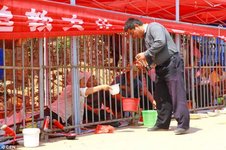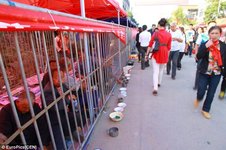Από τα "Ενθέματα της 14 Οκτ.:
Ο ξένος, ΙΙ: Στα νέα χωριά της Κίνας. Το Χουαξί [προφ. Χουασί], ένα ταπεινό κάποτε χωριό αγροτών βορειοδυτικά της Σαγκάης, σήμερα έχει τον τίτλο τού «χωριού των εκατομμυριούχων». Είναι κτισμένο με πανομοιότυπες πολυτελείς κατοικίες, όπου δεσπόζει ο ουρανοξύστης «Νέο Χωριό στον Ουρανό», ύψους 328 μέτρων. Οι 2.000 κάτοικοι μετέχουν ισότιμα στην ιδιοκτησία των μέσων παραγωγής, είναι επενδυτές και μέτοχοι στις επιχειρήσεις του χωριού. Απολαμβάνουν δωρεάν υγεία, παιδεία, διακοπές. «Κομμουνιστικοί ουρανοί φέγγουν πάνω από το Χουαξί, το χωριό των καθημερινών θαυμάτων». Έτσι αρχίζει το τραγούδι που ακούγεται κάθε μία ώρα από τα μεγάφωνα στην κεντρική πλατεία.
Εμπνευστής και διαχειριστής της μετεξέλιξης του χωριού σε θύλακα «σοσιαλιστικής ουτοπίας» είναι ο γραμματέας του τοπικού Κομμουνιστικού Κόμματος. Στην ουσία πρόκειται για μια καπιταλιστική επιχείρηση 2.000 μετόχων, την οποία διαχειρίζεται η εταιρεία Jiangsu Huaxi Group Corporation, εισηγμένη στο χρηματιστήριο της Σαγκάης από το 1998, με 57 θυγατρικές, εξαγωγές σε 40 χώρες ανά τον κόσμο και ετήσιο τζίρο 7,7 δισ. δολ.
Ενδιαφέρον είναι όμως πως στην επιχείρηση εργάζονται περίπου 35.000 εργάτες-εσωτερικοί μετανάστες, με σκληρούς όρους εργασίας και χωρίς άδεια παραμονής, αναγκασμένοι να διαμένουν έξω από τα όρια του Χουαξί. Έχουμε δηλαδή ανασύσταση του μεσαιωνικού μοντέλου της περιτειχισμένης πόλης.
Ο ξένος σήμερα τείνει να γίνει φιγούρα «οικουμενική». Θέματα που ξεκίνησαν κατά προτεραιότητα από τον ξένο (εργασία, στέγη κλπ.), τείνουν να αγκαλιάσουν ξένους και γηγενείς.
Υπάρχει ένα φάουλ στην τελευταία παράγραφο. Το "θέμα" αυτό δεν ξεκίνησε κατά προτεραιότητα από τον ξένο αλλά είναι απευθείας κληρονομιά της μαοϊκής κομουνιστικής περιόδου, οπότε οι αγρότες είχαν ταξινομηθεί ως ειδική κατηγορία του πληθυσμού με μειωμένα δικαιώματα μετακίνησης κλπ., σε αντίθεση με τη "χαϊδεμένη" εργατική τάξη (η διάκριση αστών-αγροτών έχει βέβαια ιστορία χιλιετιών
στην Κίνα, και όχι μόνο). Εξαιτίας αυτής της κληρονομιάς και λόγω της καπιταλιστικής οικονομικής ανάπτυξης στις πόλεις και της αστυφιλίας των τελευταίων δεκαετιών, σήμερα το 17% του κινέζικου πληθυσμού (230 εκατομ.) είναι εσωτερικοί μετανάστες με μειωμένα δικαιώματα διαμονής, στέγασης, παιδείας, κοινωνικής ασφάλισης, με μειωμένους μισθούς κλπ.
Τα τελευταία χρόνια γίνονται αργές μεταρρυθμίσεις ώστε να υπάρξει χειραφέτηση των Κινέζων κατοίκων της υπαίθρου από αυτό το καθεστώς· πβ. τίτλους ειδήσεων των κινέζικων ΜΜΕ της τελευταίας διετίας, από τον πιο πρόσφατο προς τον πιο παλιό:
Migrant Workers in Shaanxi to Enjoy Urban Residential Treatment Beginning Oct
Children of Migrant Workers Must Meet Three Conditions to Sit University Entrance Exams Where They Reside
Six Cities to Issue Passports to Migrant Workers and Other Non-Residents Starting September
Hebei Govt Opinions: Migrant Workers with Stable Work and Residence Can Settle in Urban Areas
Beijing Migrant Schools Closed - Beijing: Parents Bodily Block Forced Demolition of School for Migrant Workers' Children
Survey of Young Migrant Workers: 80% Sans Farming Know-how, Many Find Settling into City Life Difficult
Guangdong and Henan to Change How They Refer to Migrant Workers


